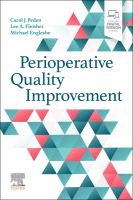Physical Address
304 North Cardinal St.
Dorchester Center, MA 02124

Key Points To improve perioperative care and safety, relevant clinical outcomes and appropriate measures must be defined. The National Quality Forum (NQF) proposed that ideal clinical measures are: Evidence-based and highlight a “performance gap.” Demonstrative of reliability and validity. Feasible…

Key Points Shared decision making (SDM) is a patient-centered approach that encourages both healthcare professionals and patients to work collaboratively for the benefit of patients. Perioperative care is a collaborative multidisciplinary approach for patients contemplating surgery, and the patient's individual…

Key points Value in health care is defined as patient-centered outcomes (PCOs) relative to the cost of achieving those outcomes. PCOs must consider the health trajectory well past discharge. Patient outcomes include that there is concordance of the expectations of…

Key Points A healthcare system can be viewed at micro, meso, or macrosystem levels. System thinking is a set of skills, behaviors, and tools that enable analysis of the processes interactions, perspectives, and boundaries of the system. Adopting a system-thinking…

You’re Reading a Preview Become a Clinical Tree membership for Full access and enjoy Unlimited articles Become membership If you are a member. Log in here

Key Points Large-scale audits have been hugely successful in gathering large volumes of data in short spaces of time to inform research and quality improvement (QI) endeavors and policy development. Built on the model of “citizen science,” they harness the…

Key points Because most improvements in perioperative care are incremental, large numbers of patients need to be studied to have adequate statistical power to detect a clinically important difference. Large, pragmatic, multicenter, randomized trials are more reliable because they provide…

Key Points Because of a paucity of randomized controlled trial (RCT) literature in perioperative medicine, well-designed “big data” studies can fill an important void. Robust, validated perioperative registries can be the foundation of research to inform perioperative practice patterns in…

Key Points Despite enormous strides in the reduction of intraoperative risk, the incidence of postoperative complications remains high and perioperative care is frequently fragmented. Significant variability in healthcare outcomes across different hospitals and hospital systems exists. Relatively new tools of…

Key Points Perioperative medicine is the medical care of patients undergoing surgery from the moment of contemplation of surgery until full recovery. The term “perioperative care” is increasingly used instead of perioperative medicine to emphasize the multidisciplinary nature of care…